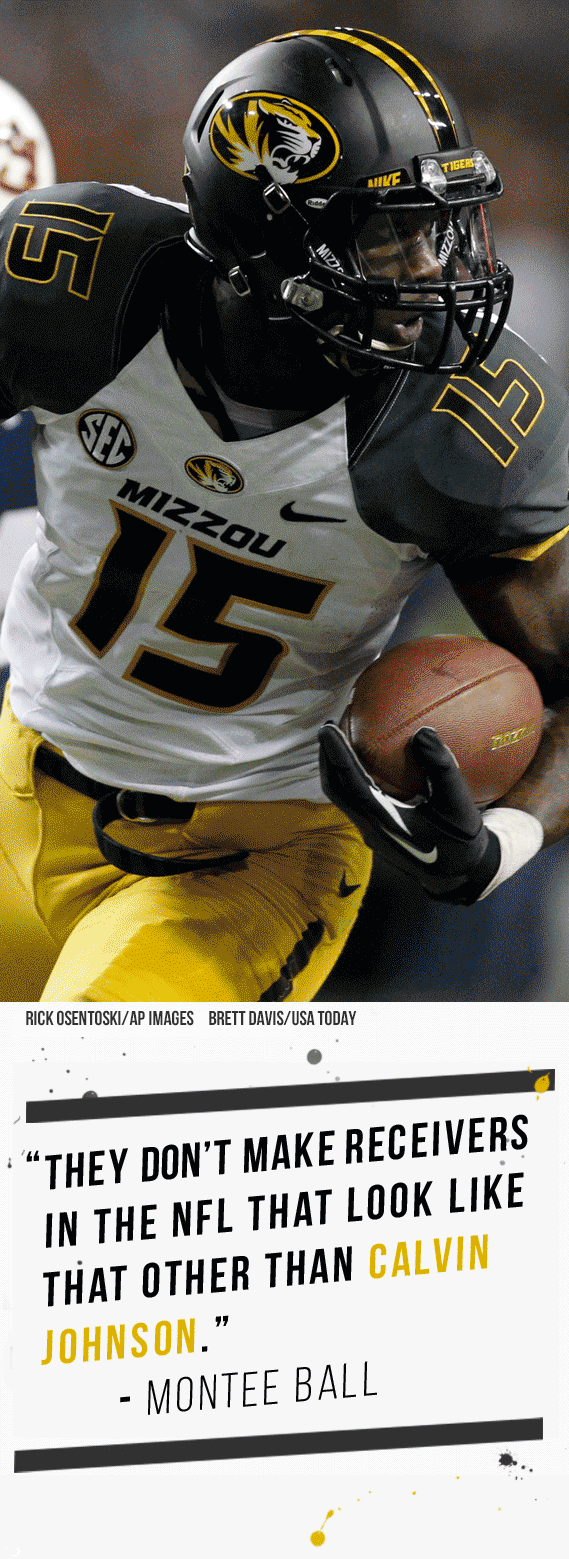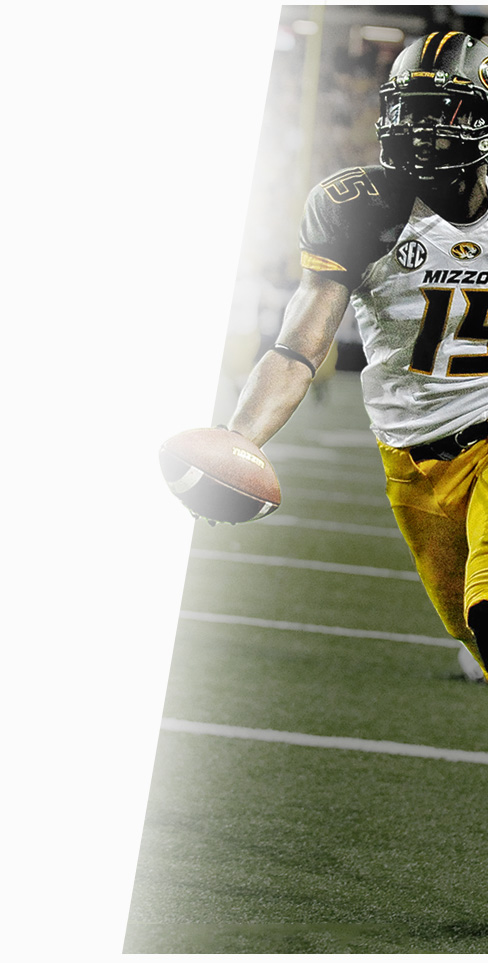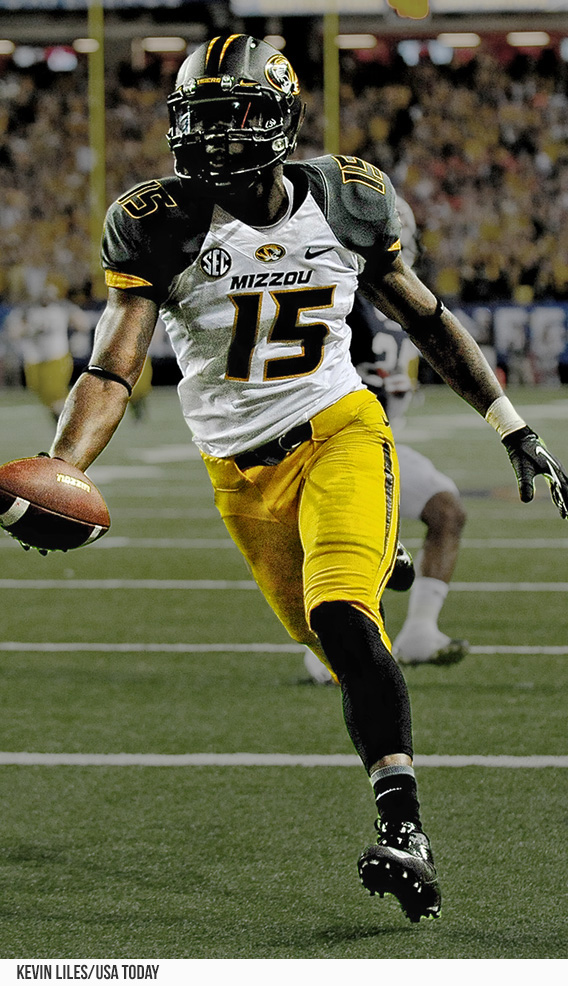Chapter 5. A Second Chance
Everyone wanted him, seduced by his size, speed and those catcher's mitts that doubled as his hands.
Nick Saban liked to Skype with Dorial. Jim Tressel, then the Ohio State coach, called John Beckham about every third day, breathing heavily about his adopted son. Bob Stoops was a frequent visitor at Hillcrest High. And Jay Norvell, then Oklahoma's wide receivers coach, offered Dorial a scholarship when he was a freshman—the only time in his career Norvell, who hand-wrote letters to Dorial five times a week for two years, had ever offered a 15-year-old.
Dorial's statistics were staggering. Playing in 47 games in high school, he caught 300 passes for a national prep record of 6,353 yards—that's an oh-my-goodness average of 21.2 yards per catch—and 75 touchdowns. Even facing constant double- and triple-teams, Dorial made play after ruthless play. Rivals rated him as the No. 1 overall prospect in the nation regardless of position.

Dorial leaps for the catch against Oklahoma State at the Cotton Bowl at AT&T Stadium.(Tim Heitman/USA Today)
Dorial shunned the out-of-state schools. "I wanted to stay close to my family and that's why I chose Missouri," he said. "I wanted my mom and dad to be able to see me play. They mean everything to me."
Before home games at Missouri, the players amble through a crush of fans on their way to the stadium, a tradition known as the Tiger Walk. Most players are stoic and grim-faced, the game-day intensity rising within them. But not Dorial, who when he spotted his parents and sister in the crowd as a freshman would bolt through the mass of humanity to hug and hold them, the rare teenager who loved to be in the embrace of his mom and dad.
Dorial started slow in his first year at Missouri—he caught 28 passes for 395 yards as a freshman—but came on near the end of his sophomore season, highlighted by his 144 receiving yards and two touchdowns in Missouri's 59-42 loss to Auburn in the SEC Championship Game. Even in defeat, you didn't have to be Pop Warner to discern that the best player on the field that night in Atlanta was DGB, which was what the Missouri fans in the Georgia Dome chanted each time he dashed into the end zone.

Dorial waves to the Missouri crowd before a basketball game against the Kansas Jayhawks. (Ed Zurga/Getty Images)
Dorial returned to Columbia for the spring semester of 2014, to a campus where the issue of violence against women was in a rapid boil. In 2011 Tigers swimmer Sasha Menu Courey committed suicide after she alleged a Missouri football player sexually assaulted her. The school failed to launch an investigation, but after an ESPN report that aired in January 2014 raised questions about what the school knew about the alleged rape, the case was reopened. The school commissioned an independent law firm, Dowd Bennett in St. Louis, to conduct an investigation. The story gripped the campus.
Two months later a woman alleged to police that Dorial forced his way into her apartment and pushed another woman down some stairs. Even though no one other than the parties present will ever know what actually happened on that boozy night, Dorial immediately became toxic to Pinkel and the university.
On the morning of April 11, 2014, the independent report by Dowd was released; it categorically stated that the University of Missouri should have investigated the death of Menu Courey. At 2:30 that same afternoon Pinkel cut Dorial loose from the team. (Pinkel, through a Missouri spokesperson, declined to comment to B/R for this story.)
But Dorial didn't leave school. At the urging of his dad, he finished the semester. A month later, after Dorial completed his classes with a 3.0 grade-point average on a 4.0 scale in the spring term, John helped his son pack his belongings and then drove Dorial back to their home in Springfield. Dorial eventually called the coach who offered him a scholarship back when he was a freshman in high school: Jay Norvell at Oklahoma.
"Coach, I'd love a second chance," Dorial said. He then explained how he needed a fresh start and needed to mature. The Sooners staff conducted an extensive background check—no red flags were raised—and then offered him a scholarship and a place on their roster.
For one season DGB, who sat out 2014 as a transfer, would become the top scout-team wide receiver in the land.
Chapter 6. 'There's Nothing Small about Dorial'
The subject is the history of receivers in the NFL. The coach is sitting behind his desk in the Texas Longhorns football offices.
"Look at who we think of as big receivers in the NFL," he said. "There was Terrell Owens, who was 6'1" and 217 pounds. There's Larry Fitzgerald, who is 6'3" and 221 pounds. There's Julio Jones, who is 6'2" and 220 pounds. And then...and then there is Dorial. He is almost 6'6" and 237 pounds, and he's as fast as any of them.
"Every football team in America wants a body like that on the roster. And let me tell you, there is nothing small about Dorial. The spotlight has been on him since he was a freshman in high school. Yes, he's made a few mistakes, but he is fundamentally a very, very good kid."
Jay Norvell, now the Longhorns' wide receivers coach, then talks—unprompted—for 10 minutes about how much he adores DGB.
Dorial arrived in Norman last July along with one of his older adopted brothers, Mikael Cooper-Falls. They lived in a small off-campus apartment, which Dorial can describe in exquisite detail because he was either there, in class or at the football complex about 98 percent of his time last summer and fall.

Dorial Green-Beckham runs a drill at the NFL football scouting combine in Indianapolis. (Brian Spurlock/USA Today)
"We were both hermits," said Cooper-Falls, who played running back at Missouri State, where he graduated last year. "Dorial grew up. He realized what life is like when football is taken away from you, and that it definitely can be taken from you. Perspective is an important thing."
Every morning at 5:30 a.m. Dorial was in the weight room—he was given the option of lifting at 9 a.m. with the other players but chose instead to work out with the scout team and freshmen. Late mornings were devoted to classes and studying (he's carried a B-minus average at Oklahoma; his major is sociology), and then the afternoons were spent in team meetings and on the practice field, where he loved to talk a blue streak of trash to the starters, telling them he couldn't be covered. He playfully begged Stoops to arrange a game against an opposing team's scout team.
"Dorial fit in the moment he got to Oklahoma," said Sooners cornerback Julian Wilson, a team co-captain. "Guys were just kind of drawn to him. If he could have played, I think we could have won the Big 12."
For home games, Dorial would stand on the sidelines in a Sooners jersey. For away games, he would go to a local Buffalo Wild Wings to take in the action. Some weekends Dorial's girlfriend of three years, Samantha Bass, would drive seven hours from Columbia to visit. But mostly, he just studied and worked. He gained nearly 15 pounds of muscle.
Dorial considered returning to Norman for his senior year, but he and Samantha are expecting their first child in early July—the same time training camps open across the NFL—and he wants to provide for his offspring. "I'm just so excited to get to a city, work my tail off and let people know that I'm not the person I've often been portrayed to be in the media," Dorial said. "I just want a chance."
For the past three hours Dorial has been sharing his life story in the back of a restaurant outside of St. Louis. When he rises from his chair and walks to the front door, every eye in the place seems to turn to him as if pulled by gravity. He smiles out at the crowd. With Dorial, it always feels like he's on a stage.
He walks outside into the blue-sky afternoon. The distant horizons hold much promise for him—there is the draft, fatherhood, the millions he will be paid—but as he slides into his car and motors away, he's really excited about what's in his near future.
He simply cannot wait to have dinner with his mom and dad.

















